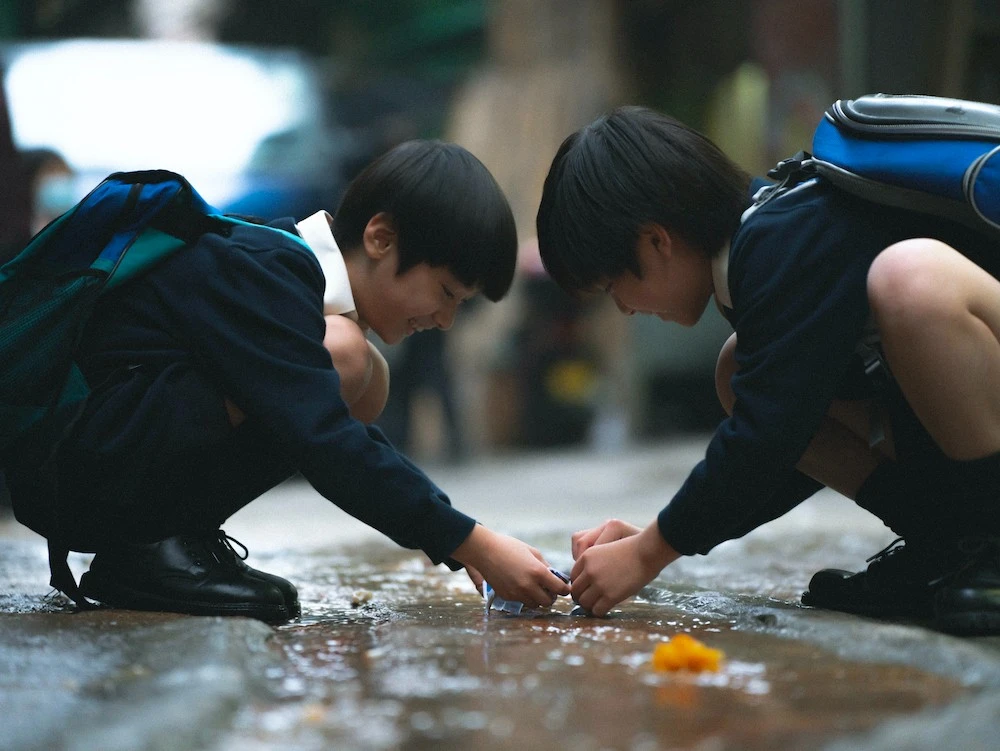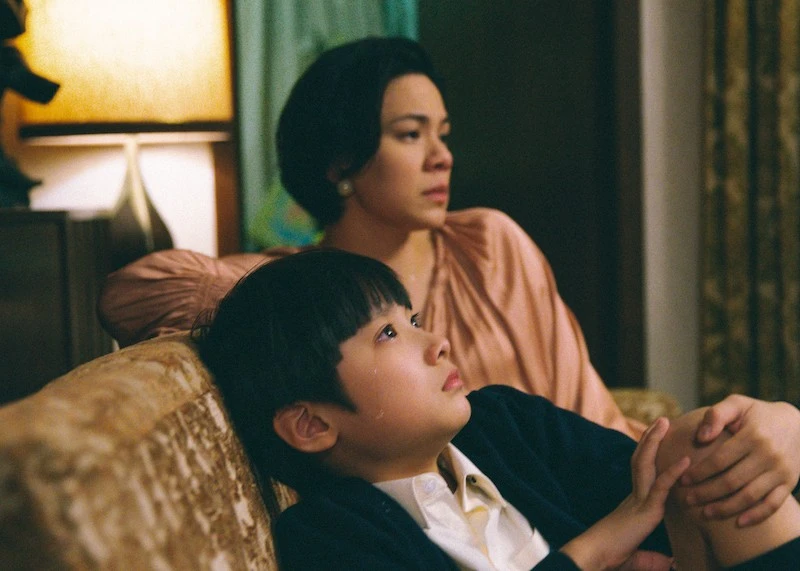
Photo: "Time Still Turns The Pages"
In the movie "Time Still Turns the Pages", there's a scene capturing the expressions of various students in the class, after Cheng Sir discovers a suicide note. The camera keenly observes their facial expressions, including the class monitor and Vincent, who faces bullying due to his hearing impairment, as well as other students who quietly observe the class. Each of them has an air of normalcy tinged with a hint of uniqueness. Just as it would be in reality, an organization conducted an analysis of six instances of suicide among schoolchildren, revealing that there were no obvious signs of unusual behavior among these students. In a subsequent survey of 150 secondary school students, only about 10% indicated they would seek support from teachers, social workers, or parents when experiencing emotional distress.
Beneath the surface, behind the façade of appearing "safe and sound," each student may be struggling with a range of emotional turmoil that remains hidden from our awareness. This brings to mind the age-old adage, "you never know what someone is going through, so be kind." It becomes crucial for us to understand how to identify the silent suffering of those around us. How can we recognize the subtle distress signals of those who suffer in silence?
According to the National Institute of Mental Health (2024), there are common verbal and behavioral signals that can indicate suicidal tendencies.
Verbal signals:
- Expressing a desire for death
- Feeling extreme guilt or shame, believing oneself to be a burden to others
- Feeling emptiness, despair, trapped, or having no reason to continue living
- Experiencing intense sadness, anxiety, irritability, or anger, along with overwhelming emotional and physical pain
Behavioral signals:
- Planning or researching methods of suicide
- Writing a farewell letter, distancing oneself from others, or saying goodbye to friends
- Giving away important belongings to others
- Changes in sleep or appetite, either increased or decreased
- Increased use of drugs or alcohol
- Engaging in high-risk activities such as reckless driving
When someone expresses suicidal thoughts, we can try the following:
- Be present for them and actively listen, providing a space for them to express their feelings without judgment. Seek to understand the story behind their emotions.
- Reduce their feelings of helplessness and lack of belonging. For example, to assure them that they are not a burden, and let them know that while you may not fully comprehend their pain, you are there to listen and support them
- Encourage and accompany them in developing a safety plan (seek professional assistance if needed)
- Support them in seeking professional help
- Minimize environmental risks by removing objects that could be used for self-harm and avoiding places that may facilitate self-harm
- While taking care of others, remember to take care of your own well-being too. This includes getting enough sleep and maintaining a healthy diet
The Search for Meaning in Life
School life holds great significance in a student's journey, and the culture, policies, and values upheld by educational institutions can profoundly influence their mental well-being. In the movie's conclusion, Cheng Sir takes a significant step by providing his phone number to the students, inviting them to reach out whenever they need someone to talk to. Through this act, he finds his purpose within the system, transforming into a healer and gradually becoming the adult he aspires to be.
How can the school system and its arrangements be made more humane in reality, fully unleashing the warmth of educators and prioritizing the mental health and growth of students once again? Children are like blank sheets of paper, and much of their worldview is shaped by adults. When we place excessive emphasis on academic performance and achievements, children tend to perceive them as everything. What can families, schools, and society do to educate children about the significance of individuals beyond academics?
Family members can enhance their awareness of their children's emotional fluctuations in daily life. They can provide a listening ear, avoiding dismissive or belittling responses to their emotions. Instead, they should guide children to recognize, understand, and express their feelings, helping them comprehend their inner needs and embrace a range of emotional experiences. Whether it's sadness, shyness, or anger, these emotions are normal, and children should not feel pressured to suppress their authentic feelings.
The journey of raising a child has been described as "being a gardener, not a carpenter." This metaphor emphasizes the importance of providing the necessary nourishment for a child to thrive, allowing them to shape their own unique identity through exposure to various elements, such as sunshine, wind, and rain. It signifies a departure from attempting to mold them into an ideal shape under parental desires.
Parents or caregivers can actively collaborate with children in exploring and reflecting upon their character traits. They can help children understand their personal strengths and weaknesses and encourage them to embrace interests and ideas that go beyond the dominant culture of society. Additionally, they can assist children in identifying their own values, such as serving the underprivileged and fostering meaningful connections with others, even amidst the prevailing social values that emphasize achieving higher socioeconomic status. A successful life cannot be confined to a specific race, occupation, appearance, interest, or income. Guiding children to cultivate a sense of security, individuality, and purpose within oneself. It involves embracing inherent worth, respecting the uniqueness of who we are, and nurturing self-confidence and self-love.
Research consistently shows that finding meaning in life and being motivated to pursue it are vital in preventing suicide. To support students on this journey, it's important to encourage them to seek out groups where they feel a sense of belonging and to foster connections with individuals who truly understand and value them. It's also crucial to guide them in reflecting on their passions and dreams, setting goals to move forward, and weaving their life experiences into personal narratives that deepen their understanding of their place in the world. By embracing these approaches, we can help students embark on a path of self-discovery and fulfillment.
References:
Kyron, M. J., Hooke, G. R., Bryan, C. J., Kiekens, G., Chen, W., Udupa, N., Joiner, T., & Page, A. C. (2023). Daily prediction of inpatient suicide attempts using routinely collected theory-driven data. Journal of psychopathology and clinical science, 10.1037/abn0000880. Advance online publication. https://doi.org/10.1037/abn0000880
Somerville, L. H., Jones, R. M., Ruberry, E. J., Dyke, J. P., Glover, G., & Casey, B. J. (2013). The medial prefrontal cortex and the emergence of self-conscious emotion in adolescence. Psychological science, 24(8), 1554–1562. https://doi.org/10.1177/0956797613475633
Stanley, B., & Brown, G. K. (2012). Safety planning intervention: A brief intervention to mitigate suicide risk. Cognitive and Behavioral Practice, 19(2), 256–264. https://doi.org/10.1016/j.cbpra.2011.01.001
Van Orden, K. A., Witte, T. K., Cukrowicz, K. C., Braithwaite, S. R., Selby, E. A., & Joiner, T. E., Jr (2010). The interpersonal theory of suicide. Psychological Review, 117(2), 575–600. https://doi.org/10.1037/a0018697
Lew, B., Chistopolskaya, K., Osman, A. et al. Meaning in life as a protective factor against suicidal tendencies in Chinese University students. BMC Psychiatry 20, 73 (2020). https://doi.org/10.1186/s12888-020-02485-4
Warning Signs of Suicide - National Institute of Mental Health


